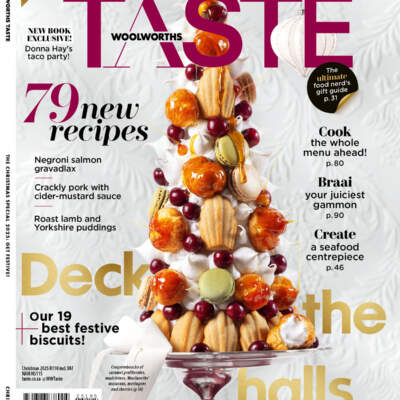Chakalaka-infused pasta? The Jozi chef reimagining local ingredients
We talk to chef Siya Kobo, the man putting a modern twist on indigenous cooking at Joburg restaurant Kobo’s Cuisine. From imifino to umvubo, here’s how he’s celebrating South African flavours in fine dining food.
UPDATE: Siya Kobo has just opened a brand new restaurant at the Johannesburg Culinary and Pastry School in Commissioner Street. Called Kobo, the restaurant focuses on progressive African fine dining with dishes like umvubo with putu pap, maas and whey jelly; tripe, samp and cauliflower with pickles, crisp mogodu, espuma and tomato gravy reduction; and a beetroot and umqombothi themed dessert with beetroot sponge, umqombothi ice cream, macadamia crumble and fruit salsa.
1. What excites you the most about local and indigenous produce and recipes?
Local produce is easily accessible and it's fresh, but what excites me the most is indigenous produce. Kobo cuisine is about telling stories through food; the produce allows us to go back in time and bring those recipes to the fore by using our industry experience. These underused ingredients bring back memories.
2. What are some of your favourite ingredients?
I love working with imifino (greens) and creating different textures using various techniques without changing the flavours and the integrity of the dish. I also love umhlabangula (blackjack leaves), urhwabe (kale-like leaves), unomdlomboyi (a plant similar to amaranth), imithwane (leaves of the young pumpkin plant), to mention few. Isigwampa and ilaxa are both created from these beautiful leaves, which are both broth-like dishes made from the boiled leaves. The difference is isigwampa has maize added to it, and is cooked down like a soft pap. Both of these feature on our upcoming tasting menu for this month. I also like working with the squash family, as it’s so versatile in both sweet and savoury dishes. We use every part of it. I love working with corn as well, making dishes like ibhangqa (where fresh corn on the cob is boiled in salted water until cooked and soft), incatsha (dried corn saved for next season's seed is dry-cooked on a lid of potjie pot – almost like pop corn but made without oil) inkobe (dried corn is this time boiled with water for a long time until soft) and isonka (corn bread). Corn season is on its way and I am excited because we also use the soft top part of the corn tree (umphurhu). We press it to get the juices or we peel it and use it on salads with unomcoyi (a white-radish like underground vegetable).
3. How have the last few months been for you? What was lockdown and the temporary closure of Kobo’s Cuisine like?
Kobo’s Cuisine stated with no funding, no investors and no capital. We essentially experienced lockdown a month prior to actual lockdown because we are situated at a backpackers’ and our clientele are mainly overseas visitors. During lockdown we were unable to do anything and it hit us hard. We now do tasting menus so people can come and experience our art, but we are also trying to stay afloat and ask for pledges from those who may be able to assist. Kobo’s Cuisine is in its infancy and cannot afford to close. When restaurants were allowed to operate, we changed our menu for the surrounding local clientele and it took us away from our path.

4. You’re planning a special heritage month tasting menu – can you tell us a little about it?
We’re working with the Johannesburg culinary and pastry school to present a five-course tasting menu. The menu celebrates our diverse heritage. People can look forward to being mesmerised and having their taste buds tantalised Mzansi style. Dishes will include Ilaxa, tshotlo bobotie, Cape Malay pickled fish and masonja dry rub, to give a sneak peek, and of course umvubo is in the mix as our signature dish.
5. Do you have any other future projects in the pipeline? What will we be seeing next from you?
I have been making videos and posting them on our social media channels. We will also be doing edutainment master cooking classes where you can come and cook our food while having fun. We are also available for private dining where you enjoy our art in the comfort of your home. We are also working with Urban Culture on a five-course cannabis tasting menu, all for the month of October. We were also blessed to do a recipe for World Flavours, a global cookbook that has been delayed due to the pandemic.
Keep up with Siya and Kobo Cuisine by following them on Instagram.


